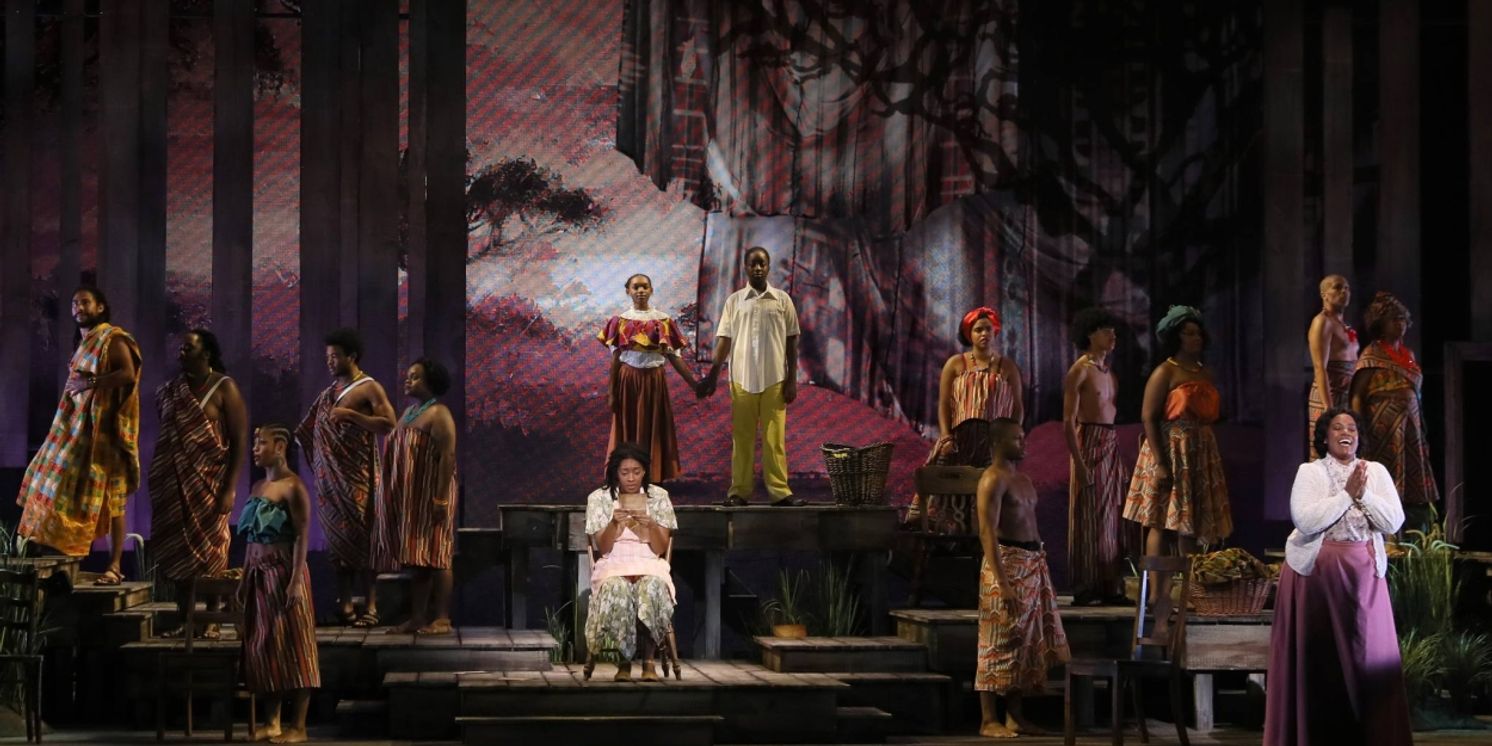Review: THE COLOR PURPLE Brings All the Feels at Pittsburgh CLO
Pittsburgh CLO continues its season with this soulful hit

As a literature major, part of me has always found it unbelievable that tight, two-hour adaptations of Alice Walker's The Color Purple have been so successful. The novel is sprawling, complex and dense, with an epistolary structure not unlike the similarly tricky-to-adapt Dracula. Nonetheless, my structural cynicism is always proved wrong. Even stripped of the overwhelming complexity and simplified to its basics, Alice Walker's story of love, faith, resilience and reconnecting with one's ancestral roots always resonates. As directed here by Christopher D. Betts, The Color Purple becomes a journey through identity: cultural identity, racial identity, sexual identity and the pure, primal question of "who am I."
Over the first few decades of the twentieth century, the story follows Celie (Kayla Davion) and Nettie (Danyel Fulton), daughters of an abusive, incestuous and predatory father (Brady D. Patsy, who later plays a good-natured prizefighter). Celie is married against her will to Mister (Akron Lanier Watson), a possessive and lecherous brute of a farmer. When Mister's advances on sister Nettie are rebuffed, he drives her off his property, leading to Celie's lifelong desire to reconnect with her long-lost sister. Along the way she finds herself in a complex bisexual love triangle with Mister's mistress, the blues singer Shug Avery (Tamyra Gray).
Kayla Davion is a force of nature as the embittered, broken Celie. When Shug's love finally breaks through Celie's pain and cynicism, Davion provides an almost explosive burst of first rage, then fear, then love and light. It's not often that performances in Pittsburgh get a mid-show standing ovation, but Davion more than earned hers at opening night. Opposite her, Akron Lanier Watson is giving one of the most complex performances CLO has seen for a long time as Mister. In Watson's hands, we see shades of gray that are sometimes uncomfortable to confront head-on: Watson is a villain, but not a monster, a man warped into an abuser and a brute by the realities of being a black man under Jim Crow. With a less skilled actor, Mister's slow and gradual redemption would feel rushed, unearned, but Watson leaves the audience with a feeling of relief as we see the man gradually overcome the "curse" placed upon him. Bridging the gap between them is Tamyra Gray, whose Shug Avery is a transitory but healing presence in the lives she touches. Gray, a familiar face who previously led Sister Act, brings big city brass, sass, boldness and sex into the drab world of lower-class Georgia; this force-of-nature attitude makes it all the more impactful when the facade is put aside at the end of Act 1 and we see Shug's truth as a tender-hearted bisexual woman with much more to offer than her body and her voice.
This being a CLO show, I like to take a moment to shout out the Pittsburgh regulars who feature in the production. Besides the aforementioned Patsy, Melessie Clark appears as an ensemblist, and Saige Smith- blessed with the ability to seemingly appear in everything, everywhere, at all times- features here as sweet and quirky waitress Squeak. It's one of the lighter roles in the piece, but Smith imbues Squeak with such charm and warmth that it's not hard to see why all the other characters love her. Jason Shavers, another local standout, only cameos in one scene as Mister's father, but it's a scene-stealing appearance. His brief turn as the aging, arthritic ex-slave-turned-sharecropper gives a clear look at what made Mister who he is.
The eight-piece band under music director Ilana Atkins sounds great, and the large cast sings with massive power and emotion across genres from blues to folk to gospel, even a turn into African choral gospel in Act 2. The show is almost entirely sung-through, with brief dialogue scenes between songs and music sequences. While Brenda Russell, Alle Willis and Stephen Bray have contributed a few strong, solidly-worked songs, much of the score feels curiously piecemeal, verses and moments rather than full, cohesive musical numbers. At first, this structure is jarring, but little by little, it grows on you: by Act 2, these musical snatches and segments are coming fast, reprising bits of previous numbers in new contexts and becoming an emotional mixtape of the show's sweeping narrative. Choreographer Tislarm Bouie keeps things moving throughout with stylized movement that only occasionally breaks into full-on dances: an African piece for Celie's long lost children, a swing dance in honor of baggy pants.
It wasn't just me having a good time at the premiere of the show. The audience was loud, vocal and appreciative. When a character said something profound or spiritual, it was not uncommon to hear an audience member shout back in affirmation. Theatre can be more than a show, more than even a message. It can be an organic, living, coooperative and cohesive being, and that's what it was this time. I don't even have anything profound to say about it to wrap this up: there are things you have to think through, and things you just have to feel. Go feel this one.
Reader Reviews
Videos
